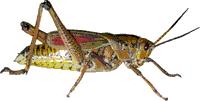Entomology Collections, General

Entomology Papers from Other Sources
Document Type
Article
Date of this Version
5-1988
Abstract
Data on offspring production by the alfalfa leafcutting bee, Megachile rotundata (F.), from three site-years were used to examine predictions of parental investment and sex ratio theory. In northern Utah, spring-emergent adults produce two types of offspring: those that develop directly to the adult stage and emerge in midsummer, and those that develop to the prepupal stage and enter diapause until the following year. For species with this kind of life cycle, it has been hypothesized that spring parents should bias their investment in summer emergent progeny towards females if spring males survive to participate in the summer mating. Results from all site-years support the theory. The sex ratio of summer-emergent progeny is always biased towards females, that of diapausing progeny is usually biased towards males, and there is always a significant difference between the two; and there is no difference in the sex ratio of diapausing offspring, whether produced by the spring or summer generations. However, the main premise of the theory remains unsubstantiated: in a preliminary estimate, we found the probability that spring males participate in summer matings to be very low. The import of the unexpected finding that diapausing progeny are 50% larger than summer-emergent progeny is discussed.


Comments
Published in Ann. Entomol. Soc. Am. 81(3): 467-476 (1988).